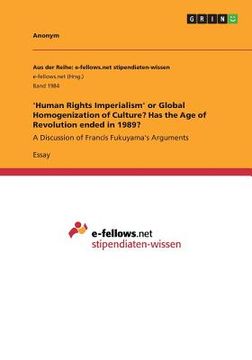'Human Rights Imperialism' or Global Homogenization of Culture? Has the Age of Revolution ended in 1989?: A Discussion of Francis Fukuyama's Arguments
Synopsis "'Human Rights Imperialism' or Global Homogenization of Culture? Has the Age of Revolution ended in 1989?: A Discussion of Francis Fukuyama's Arguments"
Essay from the year 2015 in the subject Cultural Studies - Basics and Definitions, grade: 1,3, Stellenbosch Universitiy, language: English, abstract: After briefly summarizing Fukuyama's theory, the following essay will attempt to compare and contrast several aspects of his work to Samuel P. Huntington's 1996 'Clash of Civilizations', in which he strongly opposes Fukuyama's concept of global homogenization and instead argues in favor of "a multi-polar, civilization-divergent course". I will then continue to show post- 1989 examples that question today's salience of Fukuyama's argument and also comment on the difficulties that we face when trying to define 'revolution' in general, invariant terms. The final question that is open to answer is whether or to what extent those recent events can still be considered 'revolutions', if we assume that History has really ended in 1989. Does the term 'revolution' necessarily imply directedness towards the establishment of liberal democracy, or can revolutions also occur in another direction? If the end of History means an end of revolution, what does that make the social changes that occurred after? With the fall of the Berlin Wall and the defeat of communism in Eastern Europe in 1989, "a round of self-congratulations was sparked in the West" as the Western democracies had successfully won the Cold War which further led to the belief in the "universalization of Western liberal democracy" . 200 years after the Great Revolution in France, inspired by secularized enlightenment, managed to end the absolute monarchy of Louis XVI., and paved the way for more democratic governments all throughout Western Europe, Francis Fukuyama proclaimed the end of History, as the world had reached its final destination, "the only coherent political aspiration that spans different religions and cultures around the globe" liberal democracy. Further developments in international relations, such as the rise of terrorism or the economic success o

